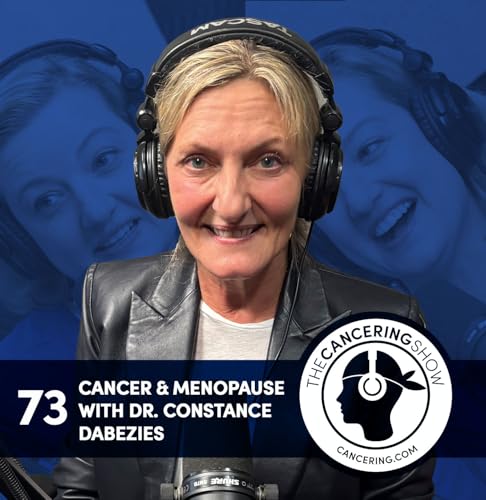
Cancer and Menopause with Dr. Constance Dabezies
No se pudo agregar al carrito
Add to Cart failed.
Error al Agregar a Lista de Deseos.
Error al eliminar de la lista de deseos.
Error al añadir a tu biblioteca
Error al seguir el podcast
Error al dejar de seguir el podcast
-
Narrado por:
-
De:
In this episode of The Cancering Show, Dr. JYP sits down with menopause specialist Dr. Constance Dabezies for a candid conversation about where cancer care and menopause meet. They talk about why menopause deserves real attention in survivorship, how cancer treatments can trigger or intensify symptoms, and what women can do to feel better. From hormone therapy to non-hormonal options and everyday lifestyle shifts, they walk through practical ways to manage symptoms.
The episode highlights the importance of personalized care, the latest evidence-based guidance from the Menopause Society, and the crucial role gynecologists play in supporting long-term wellness after cancer. Listeners also get tips on finding reliable information from trusted sources such as menopause.org.
3 Key Takeaways
1. Menopause and cancer are deeply connected, especially for survivors.
Dr. Dabezies points out that many cancer survivors are now living long, full lives after treatment, and spending a big part of that time in menopause. While menopause itself doesn't raise cancer risk (that's really about age), cancer therapies like chemotherapy or surgery can bring on menopause early and suddenly. That abrupt drop in estrogen can make symptoms more intense and raise long-term risks for heart disease and osteoporosis. It's a big reason midlife survivors need thoughtful, whole-person care.
2. Hormone therapy is safer and more Personalized than ever.
The conversation clears up a lot of confusion around hormone therapy. Today's FDA-approved bioidentical hormones, which are covered by most insurance, are very different from older synthetic versions. For women without hormone-sensitive cancers, hormone replacement therapy can be a safe, effective way to ease significant menopausal symptoms. Even for women with hormone-sensitive cancers, there are newer non-hormonal treatments and localized estrogen options that can make a huge difference, especially for vaginal and urinary symptoms.
3. Gynecologists are key partners in survivorship and long-term wellness.
Dr. Dabezies and Dr. JYP emphasize that gynecologists aren't just menopause experts; they're central partners in survivorship care. From cancer screenings and sexual health to bone strength, heart health, mental well-being, and lifestyle support, they help women navigate the full picture of post-cancer life. They encourage listeners to lean on expert guidance and use trusted resources like the Menopause Society for solid, evidence-based information.
Show Overview
00:00 Menopause Insights with Dr. Dabezies
05:08 Estrogen Loss and Menopause Effects
09:30 Vaginal Estrogen and Systemic Therapy
10:41 Non-Hormonal Menopause Treatment Options
14:59 Memory Issues and Estrogen Loss
16:30 Holistic Approach to Wellness
22:27 Osteoporosis Treatment Strategies
24:26 Gynecologist: Key to Women's Health
26:45 Women's Health Holistic Approach


